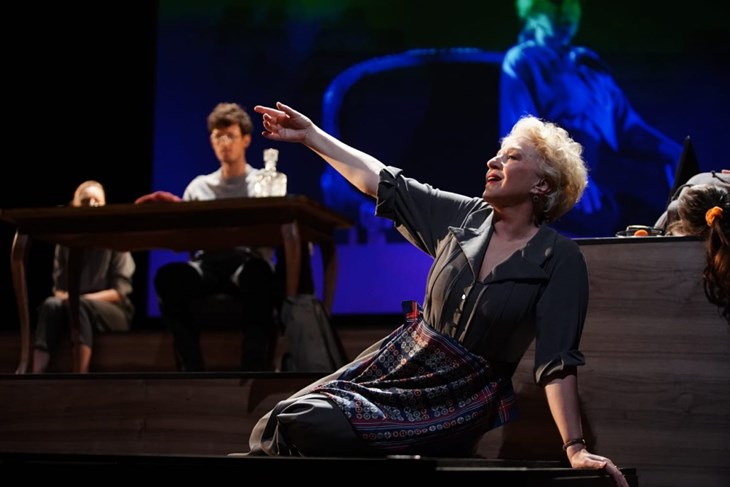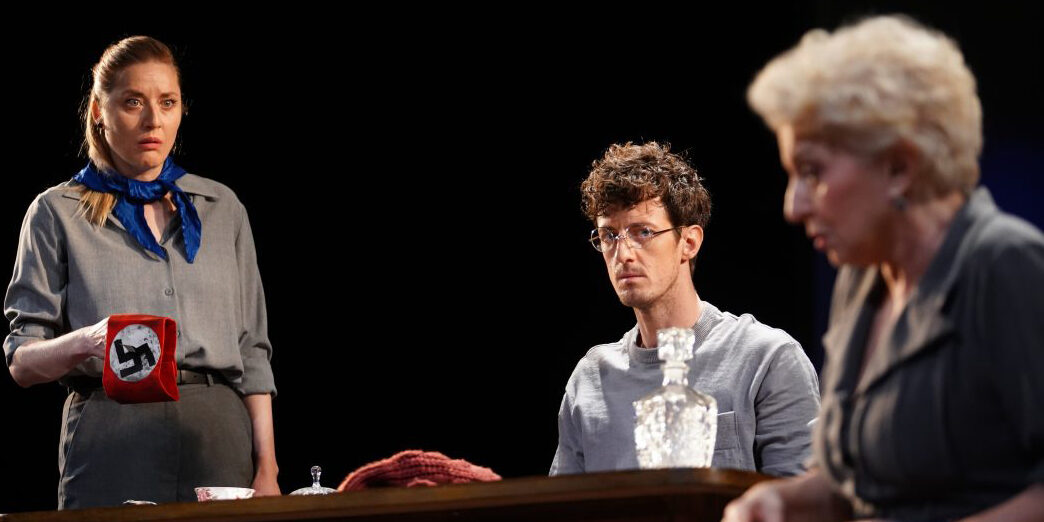Zagreb Youth Theatre (ZKM), Belgrade Drama Theatre
– I don’t want to be here. I don’t belong here.
– That’s a shame.
When faced with a truth that is almost impossible to swallow, sometimes we prefer to choke on a lie more soothing. Marius von Mayenburg’s slow-burning play The Stone (Der Stein, Kamen), that gradually pieces together a story of a single house through multiple generations of multiple families, introduces an easy premise at its beginning, only to pick away at it until we’re left with the same pieces, rearranged into a new truth.
A family has moved back into the house they used to live in long ago; a mother is nostalgic, a teen daughter irritated, a grandmother shattered by memories, a grandfather’s ghost evoked with stories of his heroism. They had bought the house in 1935 in order to help a Jewish couple escape to the US, endured harassment for standing up for their values and still keep a cobblestone thrown at their window in those darkest of times.
Yes, they had moved into a house bought from a Jewish couple that was planning their emigration to America, and yes, a stone had broken their window. But how come the Jewish couple never made it to New York; and did grandfather really die from a rogue celebratory bullet as the Red Army entered the city; and why is there an arm band among grandfather’s letters? What does his final letter say?
One of the most prominent contemporary German dramatic writers and dramaturgs, here Mayenburg stays characteristically dark, but fairly traditional in his writing, as does director Patrik Lazić in his staging of the play with dramaturg Katarina Pejović.
Precise, consistent, and dynamic in rhythm, the play keeps a neat yet breathless tempo, the plot never stops, never pauses, it shifts and meanders, cracks, sheds, and dissipates, perpetually turning into its own flipside.
– Maybe I don’t want to be proud.
– That’s a shame.
We enter the same space in different historical moments, and background projections containing the year save us from confusion, maybe just all too well. The videos also provide highly stylized moving portraits of the characters and motives, doubling their presence on stage with more detail. Although the duality is interesting, especially as it multiplies the presences and makes both un/realities on either side of the mirror haunting and surreal, the projections seem aesthetically overdone, while their potential as medium remains underused.
The combined ensemble (Zagreb Youth Theatre and Belgrade Drama Theatre) holds the dramaturgy tightly, with iconic actresses Mirjana Karanović and Doris Šarić Kukuljica at its very centre, embodying a deep connection between women whose paths crossed only for a brief moment, but one that would change the course of both of their lives forever.
Karanović plays Witha, a young bride in 1935, a frantic mother in fear for her family’s life in 1945, burying the truth in 1953, accompanying her pregnant daughter for a visit to their former home in 1978, and hiding under the table of the same haunted house as a woman at the end of her life in 1993.
Although distinctly silent in most of the play, Šarić Kukuljica is a felt presence for the duration of the performance, a fate swallowed up by an inconceivably evil time, that leaves the mark of her name with the woman who would take her place in her house.

Mirjana Karanović in Kamen. Photos: Dragana Udovičić
My name is Mieze.
The performances are all extremely focused, subtle and moving. Nataša Marković as Heidrun, the daughter-mother unable to accept the truth of her family, gives a powerful performance of being torn between stories, a delicate state of lingering guilt for choices made long before her time, and the painful question of whether to pass on the burden of truth, or the excruciating lightness of lies that refuse to stay completely underground.
Playing a young woman returning to her once-home, the house she lived in after the war, Mia Melcher is piercing, maybe overwhelmingly so, while Iva Ilinčić as the moody teen rounds up the performance with a clear, yet unobtrusive presence.
I’ve come to bother you.
Men are distinctly absent in the play, always beyond the room, city, or life we are witnessing, we merely meet the distorted memories of the grandfather, who bought the house in which he would face his tormented death. Dado Ćosić plays the late grandfather, stuck in a distant time and forever ingrained in his family, resolved to re-tell his story.
All of the characters are present on the stage at all times, choreographed orderly against a reduced monolithic stage (designed by Vesna Popović) composed of wooden blocks that open as chests. The neutral set with just a table and chair in its centre, evokes a courtroom, and as the front chest opens revealing loose soil in which memories will be buried and exhumed, we are faced with a gentle evocation of a graveyard. A heavy swing hangs in the left background, the prop of childhoods past and mis/remembered. The costumes by Marta Žegura are a grey monolith, suggestive and able to transform with slight changes in detail. Overall the staging is clean, clear, compact, and conventional, relying mostly on the text itself, and performances that are nuanced and committed.
Stop digging!
Given that this is a coproduction between Belgrade and Zagreb, always a welcome and refreshing addition to our repertoires, a specific layer of affect and meaning is co- produced by the shared history of war, and of all the horrors that seem unimaginable… until they happen.
And while we deeply believe and trust we could never do the monstrous things the history of our civilization recounts as parts of our legacy, both distant and close, the unbearable truth is that many of us may find ourselves on the side of history we’d never imagined we’d be on, not even noticing how and when we’d turned into monsters.
Mayenburg, Lazić, and Pejović along with the ensemble force the questions of how easily we would slide into opportunism, how much would our values cost, what would it take for us to forget everything we stood for, and then forget what we’d forgotten in order to keep going?
Only a society, a community, able to construct a story, develop a myth, is able to
survive…
The truth is that we cannot survive some stories, that some truths could kill us on the spot, that the freedom that proverbially comes with truth is sometimes too much to stand. If told enough times, does the lie truly become truth, does the original story stop breathing if we keep it under the surface long.
Credits:
Co-producers: Zagrebačko kazalište mladih, Beogradsko dramsko pozorište
Director: Patrik Lazić
Dramaturg: Katarina Pejović
Croatian translation: Boris Perić
Serbian translation: Drinka Gojković
Scenography: Vesna Popović
Costumes: Marta Žegura
Lighting: Aleksandar Čavlek
Sound: Teodora Đurković
Video: Jelena Tvrdišić
Cast: Mirjana Karanović, Doris Šarić Kukuljica, Dado Cosic, Natasa Markovic, Mia Melcher
Ana Fazekaš (Zagreb, 1990) is a critic, editor, and essayist in the fields of performing arts, literature, and pop culture, currently working as freelance writer for various publications including Kulturpunkt.hr, Kazalište, Kretanja/Movements, Kritika HDP, and Booksa. She holds an MA in Comparative Literature and Russian Language and Literature, and is currently working on her PhD thesis on the Faculty of Humanities and Social Sciences in Zagreb, focused on psychoanalysis, gender studies and transdisciplinary art theory.








